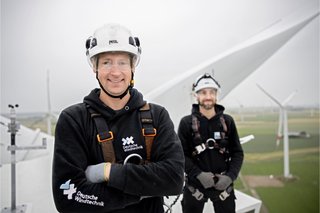In combination with a variety of other people, events and coincidences, this was the birth of Deutsche Windtechnik. Since then, as one of the two owners, chairman of the board and a permanent partner, he has been closely involvd with the company throughout its development, helping to shape it and playing an inspiring role in many of those developments.
Klaus, 10 GW under maintenance at Deutsche Windtechnik worldwide: What does this milestone mean for
the
company and the market?
This is certainly a huge win for everyone who values competition. In the early days, the market was characterised by the fact that every turbine manufacturing company was also the only service company for that turbine. A natural monopoly, so to speak. And monopolies are always a bad thing. Deutsche Windtechnik led to this structure being broken up and to a quality and price competition. 10,000 MW of capacity under service contract shows that this achievement is hugely appreciated by the market.
And for
you
at a personal level? Have
your
expectations been met?
You can't really say that. Our aim was to establish a service alternative for Vestas and Siemens turbines. We envisaged a maximum possible volume of 3,000 MW. We certainly didn't expect to be active worldwide after a little more than a decade and provide service for 10 GW, including so many other turbine types. For me personally, however, this also means a change in focus: For example, how can we handle 50% growth in sales in 2020 satisfactorily for our employees and customers. Growth is great, but also exhausting and sometimes painful.
What exactly is Deutsche Windtechnik's formula for success?
Our work is carried by many shoulders. In the end, however, it all comes down to what the technician does with the turbine on-site. I think this is something that people in our company understand and is conveyed in our enjoyment of our work and in our service towards our customers.
What's coming next? What are the opportunities and risks?
I think we are now working with almost all of the core markets and core brands, so things might get a little quieter. We have the opportunity to go deeper, to further consolidate the service network in different countries. To improve quality and increase efficiency. One risk would be if we forget who we are and where we've come from. But what worries me most is the ways in which established manufacturers are trying to eliminate competition. For example, Vestas are building software locks into their latest turbines, and there is only one reason: to prevent competition. This is extremely dangerous for us and for all customers.


